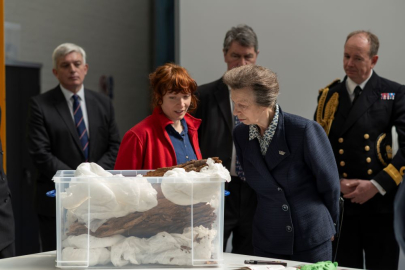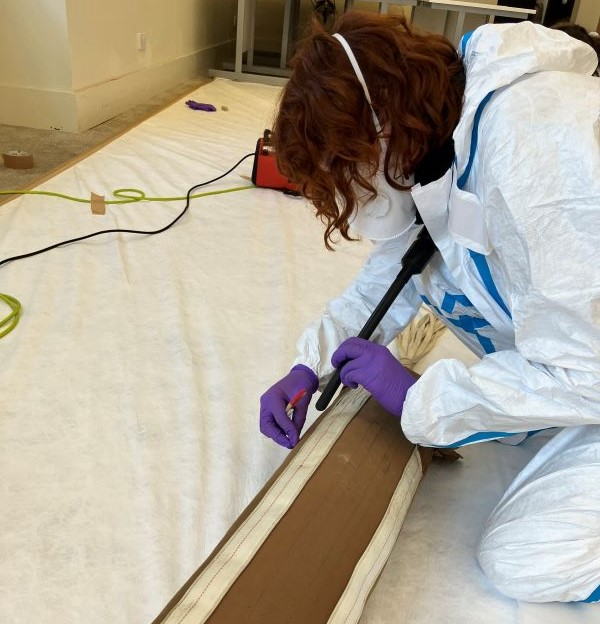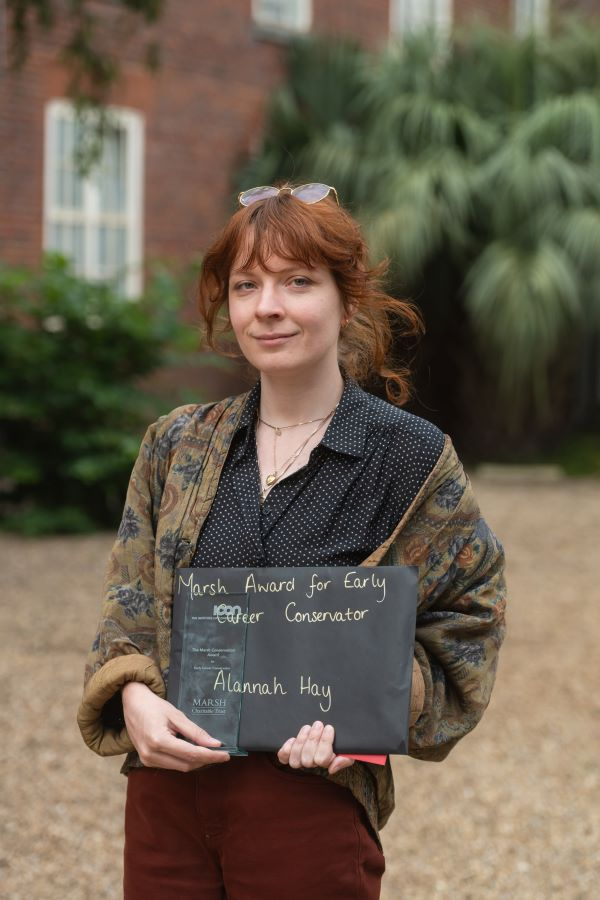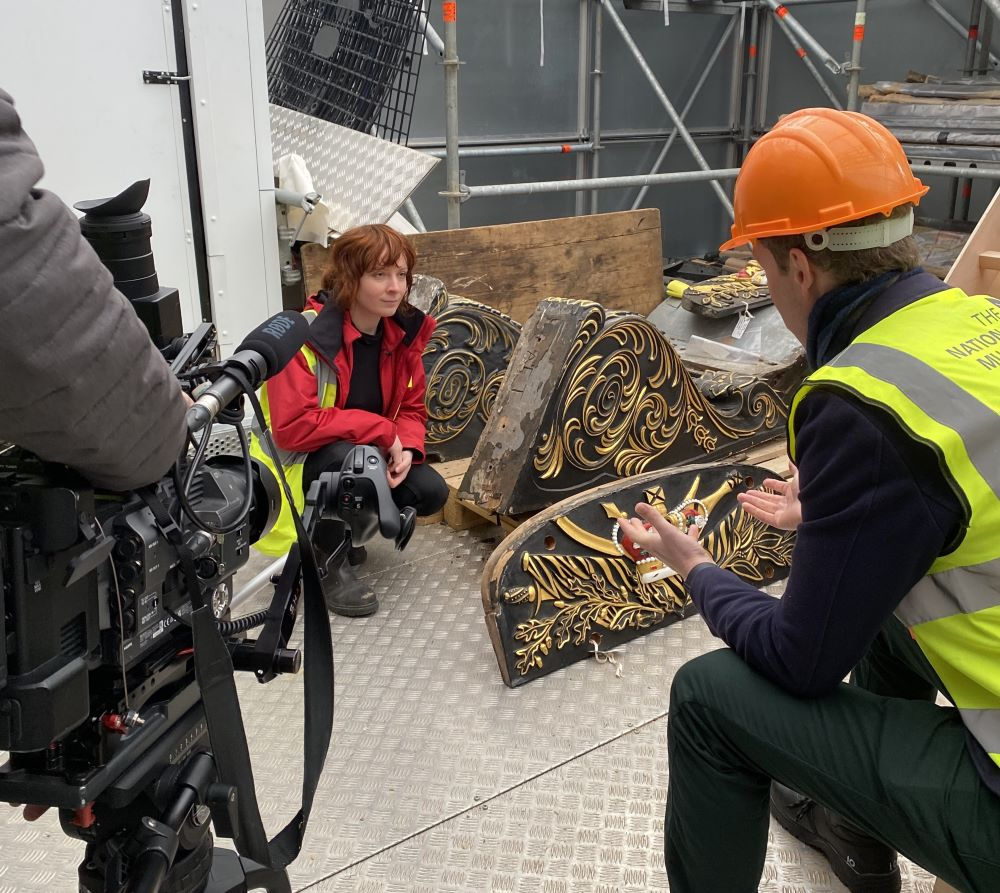Meet Alannah Hay: Article in Iconnect
- View news filtered by: 21st Century
- View news filtered by: Museum behind the scenes
- View news filtered by: Conservation
- View news filtered by: Museum Teams
- View news filtered by type: Interview

Alannah Hay talks about her early career progression, advocating conservation work to HRH Princess Anne, winning a 2024 Marsh Conservation Award and her hopes for the future
I remember taking a career quiz in secondary school being told that I should be a graphic designer. This would have been around 2006 when conservation wasn’t really known as a career path, so you either went down the ‘artsy route’ or the ‘STEM route’ depending on what you had the grades for.
I first came across conservation as a career after my first degree, in design, when I was working as a temporary cleaner. I saw a cleaning-type role listed at a National Trust property but it required another degree, one in conservation, and as I was already £20,000 in debt, there was no chance I was going back to university. However, after five years working as a digital marketing manager, I was ready to take a chance on that other degree.
When applying to the City & Guilds of London Art School, I thought back to my first ‘job’, working for my grandparents at their small holding. In 2001 they lost their animals to the foot and mouth outbreak and so they turned to selling garden stoneware. As a teenager I spent weekends cleaning the cast-concrete birdbaths on display outside or fixing the broken statues for the bargain table.
Starting that course was the first time I truly enjoyed studying. I also felt that connection back to things I enjoyed and was good at, something I’d never felt working in design and marketing.

When I graduated in July 2022 I was awarded a Venice in Peril scholarship which involved three months cleaning and condition reporting a large funerary monument in the church of San Giorgio Maggiore.
Between graduating and leaving for Venice I was working with the team at Taylor Pearce on the now award-winning Popes’ Grotto project. In October of the same year, I was given the incredible opportunity to visit Hyderabad, India, to take part in an Architectural Conservation Traineeship which was coordinated with the World Monuments Fund and Commonwealth Heritage Skills Training Programme.
I joined the National Museum of the Royal Navy (NMRN), Portsmouth, as a conservation technician in March 2023, on a temporary contract. Because I had studied over the pandemic, I had not had the chance to get museum-based experience, so this was the perfect opportunity. I enjoyed working in the team so much that when a permanent conservator role came up, I applied, and here I am.
There is a lot of variety to this role, which is what I really love about it, and it keeps me feeling engaged. Between managing the shipkeepers on HMS Warrior, working on HMS Victory and assisting with The Victory Project work, I also get artefacts ready for loans or treat collection objects when needed. I can often end up doing 20,000 steps around the dockyard in a day! I also enjoy being integrated in a multidisciplinary team of specialist shipwrights and riggers, who I’m continually learning from, and I jump at the chance to try things like caulking or climbing the rig.
I wouldn’t be able to do all this without the support of my line manager, Jenna Taylor, Principle Conservator (Objects) at NMRN, who put me forward for the 2024 Marsh Conservation Awards. Winning the Early Career Conservator award has been both a career highlight and incredible vote of confidence.

Though I often work behind-the scenes, part of my role is ‘meet the teams’, where there is the opportunity to talk directly to visitors about our work on The Victory Project. I even got the chance to speak with our patron, HRH Princess Anne, and ITV News about the role of a conservator in large-scale projects like this. Seeing the interest and engagement with what we do is always gratifying and it feels like it helps to raise the profile of conservation and highlight why it’s important to draw on our input and skills in major projects.
It was inspiring to attend the talks at the Institute of Conservation’s 2024 Conference, Icon24, and to hear how many other conservators are engaging with audiences and communities, and the value that this has added to their work.
When it comes to the future of the conservation sector, I remember being told by a tutor that with treatment we aim to add another 100 years to an object’s life but trying to think about what’s on the horizon for conservation itself in these terms is tricky. However, I think conservators are excellent problem solvers, so I hope that the profession continues to grow and diversify, and we’ll figure it out.

The next step for me is working towards Icon accreditation, which I feel is a few years off yet but having that in mind helps to guide me in my work now and think about how I want to develop as a conservator. I haven’t thought too much beyond that – I still can’t really believe that I get to wake up and go to work as a conservator.
This article was first published in the Autumn/October 2024 issue of Iconnect, the membership magazine of the Institute of Conservation (www.icon.org.uk). (c) Icon 2024.